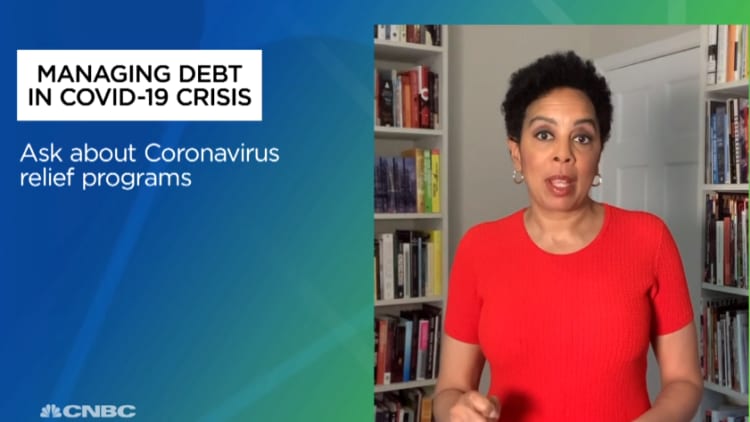Almost all states are starting to reopen this week, but that doesn't mean Americans should expect the economy, or their own finances, to suddenly return to normal.
Although it can be tempting to start spending normally as businesses reopen, some Americans still need to "hunker down" and continue to be frugal, says Tiffany Aliche, personal finance expert and founder of The Budgetnista.
That's because more than 36 million Americans lost their jobs over the past eight weeks as the coronavirus pandemic prompted much of the country to temporarily shut down. "This number is staggering," says Lauren Goodwin, an economist and portfolio strategist at New York Life Investments. Especially when you consider that the U.S. economy added about 20 million jobs over the roughly 10 years preceding this crisis.
The loss of so many jobs, paired with the fact that retail sales nosedived by a record 16.4% in April, has many experts and economists believing that the U.S. is already in a recession.
Yet not everyone has been affected the same way during the pandemic. For some Americans, it might be a good time to take advantage of market trends and federal assistance programs to get ahead financially.
Not sure what money moves you should make right now? Aliche outlines what steps Americans should consider taking, depending on their financial situation.
Those who need to hunker down
If you're already collecting unemployment or are worried about losing your job, Aliche says it's time to get used to phrases like "tighten up, spend less and save, save, save." With that in mind, she recommends those in this situation do three things when it comes to your spending right now.
1. Prioritize your bills
The most important step you can take if you're worried about your income is to prioritize what you're spending on, Aliche says. While many Americans recently received $1,200 stimulus checks from the federal government, and more may be on the way, that amount likely won't cover all of your expenses.
To figure out which bills and expenses you need to pay first and which you can delay, Aliche recommends asking yourself two questions: If I don't make this payment, will I be unhealthy? If I don't make this payment, will I be unsafe?
If the answer is yes to either of those, pay that bill as best as you can. If you haven't already, look into many of the assistance and payment deferment programs that utility companies, cell phone providers, lenders and landlords may be offering.
"Lean into that help," Aliche says, so you can make the most of the money you do have. It doesn't make sense to put all of your stimulus money or your unemployment check toward your mortgage if you have a federally-backed loan that you can defer payment on for six months without racking up fees or interest.
2. Hold off on aggressively paying down debt
Along with prioritizing your expenses, only make the minimum payment on your debts if you lost your job or are struggling financially, Aliche recommends.
"For the most part, I'm telling people to leave your debt alone. Focus on other things," she says. That advice can feel contrary to what Americans usually hear, but you don't know what's going to happen tomorrow, next week or six months from now, Aliche warns. For now, focus on keeping current with your debts, but don't go to extremes.
3. Save as much as possible
If you still have an income, make sure you're saving. "Now, more than ever, having emergency savings is critical," Aliche says. The goal is to have six months worth of what she calls a "noodle budget," which is the lowest budget you can get away with, she says.
To calculate this, imagine you have to eat only Ramen noodles and pay for the barest basics such as rent and utilities, Aliche says. What is the lowest possible amount that you can spend to live on each month? That number is your noodle budget.

Those who should try to get ahead
If your job is fairly secure and you have a decent amount of emergency money saved up, you may want to consider making this time count financially, Aliche says. Here are two strategies that can help you get ahead, as well as one move Aliche recommends avoiding, even if your income hasn't been impacted.
1. Pay down student loans
Right now is a good time to put a little bit more toward your student loan debt if you've got room in the budget, Aliche says. Until September 30th, payments and interest have been suspended on federal student loans, so any money you do put toward your loans will go directly toward paying down the principal.
That means those who can make payments right now are going to make a bigger dent in their loans than when they're paying interest on top of the principal.
2. Invest
If you don't have student loans, it may make sense to consider investing more right now, as long as your income is stable and you have robust savings, Aliche says. Consider bumping up your 401(k) or Roth IRA contributions, and if you don't have one of these accounts set up, now may be a good time to get started, Aliche says.
If you already have a 401(k) and Roth IRA set up and funded at a comfortable level — typically, experts recommend saving at least 15% of your annual income for retirement — consider opening a brokerage account. Younger investors have time to let their investments recover and grow, so it's worth buying stocks and funds now, when they may be available at a lower price, and sitting on them until they rebound.
That doesn't mean you need to start picking stocks and day trading tomorrow. Instead, start slow and look for investments that are diversified and balanced, such as a target date fund, a total stock market exchange-traded fund (ETF) or index mutual fund that covers virtually the entire U.S. stock market.
Even if you don't increase the amount you're putting toward your retirement or investment accounts, keep investing and making regular contributions to your 401(k). This routine influx of money into your investment accounts, known as dollar-cost averaging, is a great strategy for long-term investors because it takes emotion out of the equation and keeps you from selling out during market lows and buying in at market highs.
3. Think twice before spending big
Even if your income hasn't been affected by the pandemic, it may be a good idea to pause any major purchases right now, Aliche recommends. That's because the future is still uncertain. "Preserving your capital is everything because we don't know how long this is going to last," or what major expenses will come up, she says.
When it comes to buying a home, for example, interest rates and mortgage rates are low right now, but that doesn't necessarily mean home prices are at their lowest point. "This also might be the top of a market for a while," says Aliche. "Typically in market crashes, you see housing prices drop. You may have the opportunity to purchase a house at a cheaper price."
If you do buy a home now, make sure it's a good deal and that it's a purchase you need to make, Aliche says. That home may be worth less later on, which could mean you end up paying more on a mortgage than your home is actually worth, a situation known as having your mortgage underwater. "A year from now, that same house might be worth $50,000 less," Aliche says. Or you may lose your job or incur major medical expenses, making it difficult to keep paying your new mortgage.
At the end of the day, the key to staying on the right path financially is all about getting the fundamentals right, Aliche says. "It's budgeting, it's having a savings plan, it's managing your credit, managing your debt, making sure you are fully insured and managing basic investing as it relates to your retirement," she says.
Check out: The best credit cards of 2020 could earn you over $1,000 in 5 years



